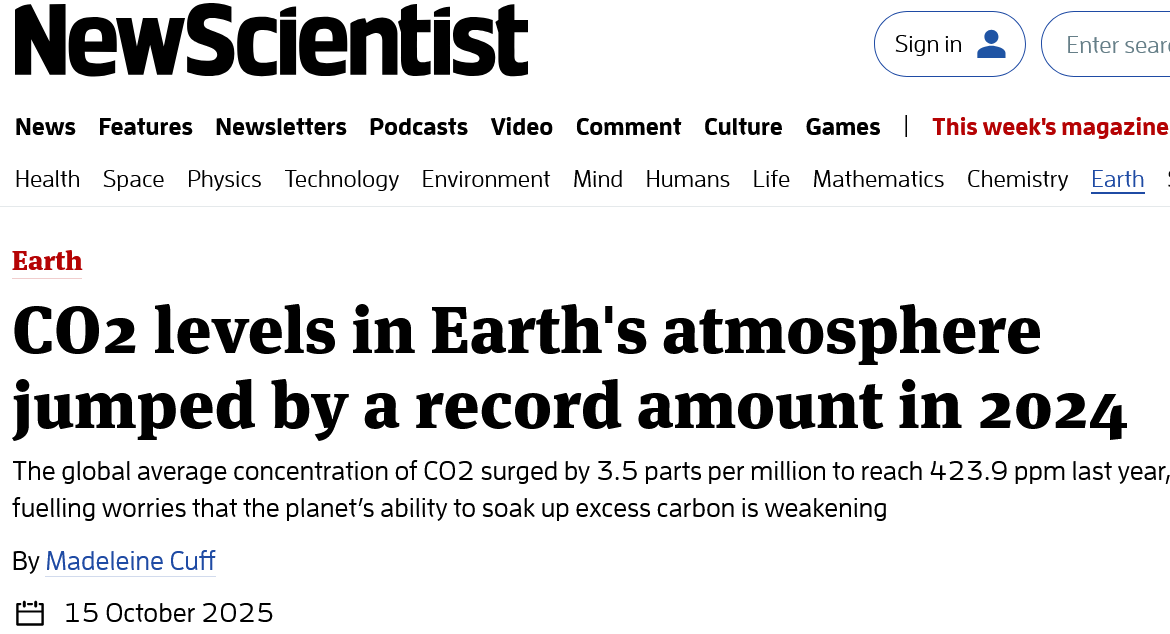Amid the chaos and constant alarm that is MAGA GOP governance, the news from the World Meteorological Association (WMO) about the large increase in atmospheric carbon didn’t get a lot of press attention. But it is worrying to anyone who understands climate science, especially when thinking about surging electricity demand for AI data centers. Some techno-optimists have been promising us that AI will solve the climate change problem. Is their optimism justified?
The WMO Announcement
The WMO data show that the rate at which greenhouse gases (GHGs) concentrations in the earth’s atmosphere is increasing, which suggests an increasing rate of global warming. Most people now understand global warming; after all, a lot of it is simple science.[1] The WMO report cites both human emissions and wildfires as sources of the jump, as well as reduced sequestration of carbon by plants and oceans. The worry is that if these so-called carbon “sinks” become less effective over time, it could trigger runaway increases in the atmospheric carbon and warming.
If you go to the WMO press release, it requires three additional clicks to get through to the actual report, which is called the “WMO Greenhouse Gas Bulletin No. 21.” The report says this about carbon sinks:
There is a significant concern that terrestrial and ocean CO2 sinks are becoming less effective, which will increase the fraction of [GHG emissions] that stay[] in the atmosphere, thereby accelerating global warming. Sustaining and enhancing greenhouse gas monitoring is even more critical now to understand these feedbacks …
Of course, the Trump Administration is shutting down exactly those sorts of monitoring programs. The report also says this about carbon sinks:
The portion of [GHGs] emitted by fossil fuel combustion that remains in the atmosphere (the airborne fraction, (AF)), varies inter-annually due to the high natural variability of (mainly terrestrial) CO2 sinks, although there is little evidence for a long-term AF trend (see the cover story in WMO Greenhouse Gas Bulletin No. 17).
That language sounds as though this year’s reduced sequestration may be either the beginning of a trend or a one-off.[2] But regardless, if climate change increases the loss of vegetation from wildfires, that decreases the sequestration capacity of sinks all else equal.
Surging Demand Growth
I have discussed surging electricity demand growth from data centers — and the strain they are placing on electricity markets — in this space before. But since then the news is full of stories that tech companies “cannot wait” for the grid to supply the reliable energy they need, and are instead procuring their own supplies. And despite the tech industry’s earlier commitment to procuring clean energy, that often means relying on natural gas-fired power.
This is frustrating for those of us who worry about climate change. Across the U.S. there are large backlogs of new, clean power projects — mostly solar and batteries, plus some wind and natural gas — waiting for approval to connect to the grid. For different reasons in different places, regulators have been slow to clear those interconnection queues. Meanwhile, big tech companies want reliable electricity now. And since public utility law in every state allows customers to “self-supply,” that is what some data center developers are doing.
Will Free Markets Provide?
The most recent Nobel Prize in economics went to three economists whose work explored the connection between market-induced innovation and human progress. A.I.’s most enthusiastic boosters promise that A.I. will spur the kind of innovation that will solve the clean electricity supply problem that its growth is exacerbating.
And who knows, maybe it will. A.I. has already shown promise in helping regulators clear the new project backlog more quickly. Maybe it will unlock the secret of affordable nuclear fusion electricity … or cheap, long duration electricity storage … or affordable carbon sequestration … etc. But skepticism about this technological optimism is in order for two reasons.
The first reason is the tech industry’s long track record of lofty-but-unfulfilled promises. Who remembers tech sector promises that Bitcoin would inevitably replace the dollar (and other national currencies) as the world’s medium of exchange? Instead, it has become a power-gobbling way to launder money, as well as just another commodity with a fluctuating value. Who remembers promises that the Internet would make us smarter by putting information at our fingertips? Or happier by connecting people? It has done neither of those things while instead enriching a politically naive and otherwise peculiar set of 21st century Robber Barons.
The second basis to be skeptical that A.I. will solve the clean energy challenge is that most industries devote their investments to producing the most lucrative products. For example, according to the World Economic Forum pharma companies spend much more on erectile dysfunction drugs than disease treatments that most would consider more important medical problems. So, in the absence of a price on carbon or mandated GHG emission reductions, can we really trust that A.I. resources will be channeled toward solving the climate problem?
Meanwhile, the prospect of more rapid warming remains. Republicans’ claims to the contrary notwithstanding, climate change-related severe weather is driving up prices for electricity, mortgages, and property insurance, to say nothing of the dislocation and other human costs it causes. As atmospheric carbon increases, so do all of these costs.
In short, if A.I. is going to solve this problem it is going to need a policy push. And for reasons explained here ad nauseum, today’s GOP is unwilling to provide that push. And that is a problem that can only be solved at the ballot box. — David Spence
—————-
[1] Certain compounds (e.g., carbon dioxide) trap more of the sun’s heat than other gases in the atmosphere. When you increase the percentage of those heat-trapping gases in the atmosphere, you warm the earth (land and seas) over time.When you heat water it expands: ergo, sea level rise. Warmer air holds more moisture: ergo, more severe rain events. Etc.
[2] Frustratingly, when I tried to click through to WMO Bulletin No. 17, the link was bad.






